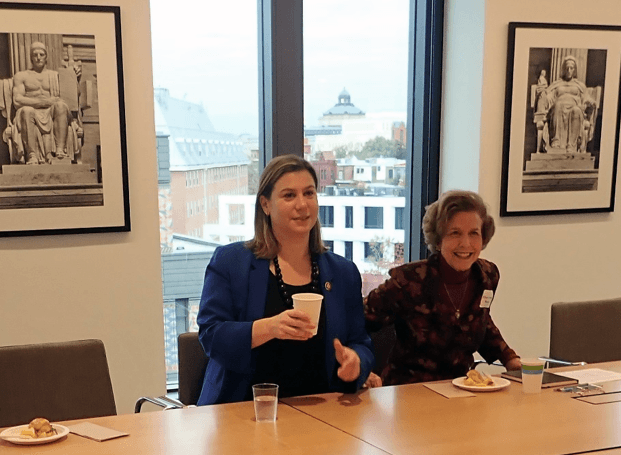On October 29, 16 members of the President’s Council of Cornell Women (PCCW) had breakfast on Capitol Hill with Representatives Sharice Davids JD ’10 (D-KS) and Elissa Slotkin ’98 (D-MI). These two Cornell alumnae are members of the historic 2018 freshman class of congresswomen who are “changing the face” of the institution, according to Karen Goldmeier Green ’87, who helped organize the event.
Green came up with the idea for this event when she noticed that two of the 36 women newly elected to the US House of Representatives in 2018 were Cornell graduates. “We decided to host the breakfast to recognize, celebrate, and get to know these dynamic women in Congress,” she said. There are five Cornellians currently serving in Congress.
PCCW members Eileen Corwin Mason ’64 and Margie DeBolt ’76 shared their notes from this intimate gathering of Cornell women, at which the newly elected congresswomen talked about their personal journeys from their home states, to Cornell, to Congress.

From their home states, to Cornell, to Congress
Slotkin spent her early life on her family farm in Holly, Michigan, a small town near Flint, Michigan—where issues around water quality and lack of infrastructure have garnered national attention. She attended the College of Agriculture and Life Sciences, where she majored in rural sociology. She described her time at Cornell as “formative and very positive.”
Slotkin began her graduate studies at Columbia’s School of International and Public Affairs just two days before September 11, 2001. After 9/11, her focus turned to national security. When she finished her master’s degree, Slotkin was recruited by the CIA as a Middle East analyst, and she did three tours of duty in Iraq, alongside the military. She went on to serve as acting assistant secretary of defense at the Pentagon in the Obama administration. In 2017, she began her campaign to represent Michigan’s Eighth Congressional District.
Davids has the distinction of being one of the first two Native American women elected to Congress and the first openly gay representative from Kansas. Raised by a single mom in the US Army, she was a first-generation college student. Davids worked throughout the eight years she spent at community college and the University of Missouri.
Encouraged to apply to Cornell Law School, Davids said she “hit her stride” when she matriculated in 2007. After graduating in 2010, she worked on economic development at Pine Ridge Indian Reservation. In 2016 she was selected as a White House Fellow and worked in the Department of Transportation.
According to Mason and DeBolt, Davids was both “admiring of and concerned about” the federal workforce. She returned to Kansas to see if she could find “the perfect candidate” to run for Congress. Not finding anyone suitable, she entered the race herself and was elected to represent an urban/suburban district of Kansas City.
Changing the face of Congress
Davids said that she views the 2018 election as important in reframing expectations around who can successfully run for Congress. “Anyone can run; it’s not just the national party that decides,” she said.
Both Slotkin and Davids said that when they met with the other newly elected representatives to Congress, “it was amazing how similar all their stories were.” They and the other freshmen focused their campaigns on infrastructure and local issues.
Slotkin and Davids also agreed that the historic number of women in Congress is resulting in “interesting changes in behavior.” They noted that there is a new level of collaboration, as many of the congresswomen fundraise together.

“Many of us are familiar with the feeling of being ignored,” according to Slotkin and Davids. They can empathize with voters who feel that they have been ignored or left out of the political process. And they are intentionally asking their constituents’ opinions—including women of color and those constituents who might not have been asked before.
Congresswoman Davids spoke about the importance of listening to her constituents who frequently say, “Thanks for listening to me. Elected officials don’t ask for our opinions.”
Slotkin and Davids noted that the age of representatives is now, on average, 15 years younger than in the past. Since more representatives have school-age children, they are advocating for more responsible scheduling of congressional activities—so that members can attend their kids’ games and other events back home, when they have committed to do so.
The current members of Congress now reflect a more representative socioeconomic background, according to Slotkin and Davids. They said that current members can relate to a government workforce that was forced to skip a couple of pay checks.
“I was thrilled to meet these new congresswomen,” said Cornell Trustee Dale Rosenthal ’78, a PCCW member who attended the breakfast. “Each spoke about the impact of their Cornell education in shaping their desire to serve their constituents,” she said.


